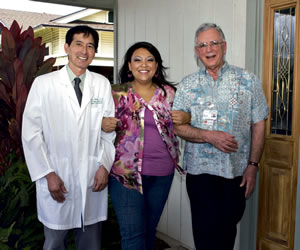Dr. Thomas Kosasa

Nathalie Walker photo nwalker@midweek.com
Dr. Thomas S. Kosasa has a resume unlike many others. His has to include summaries explaining his experience as a doctor and professor, sandwiched between details of his enthusiasm and participation as a pilot and race car driver. On many occasions, he has been pegged as a modern day Renaissance man, but he has one main focus, and that is simply to help people.
“The one thing that is most close to my heart is just helping people have babies,” says Kosasa, who has worked for most of his career as a reproductive endocrinologist helping to give birth to close to 4,000 babies who otherwise may not have been born.
An independent physician, Kosasa works closely with Pacific In Vitro Fertilization Institute, assisting mothers from a wide age range who, bothered by difficulties of conceiving a child through traditional means, still have the desire to give birth.
“In the beginning we had about a 20 percent pregnancy rate, which was high for that time. Now, with the technology and knowledge we have, we can pretty much say that every woman can have a baby as long as she hasn’t had a hysterectomy and has a uterus,” says Kosasa, who was featured on MidWeek‘s cover Feb. 5, 2005 and is pictured above (left) with Jacquelyn Low, Hawaii’s first “test tube baby,” and PIVFI co-director Carl Morton.
“Recent technology is increasing to help women get pregnant with their own eggs even though they may be older,” he explains. “If not, we can use donor eggs and the husband’s sperm, so it is his genes.”
With all of his accomplishments in the medical field, Kosasa has been highly recognized throughout our community. In 2009, he was named honorary professor emeritus with the University of Hawaii at Manoa, and is a division head at the John A. Burns School of Medicine.
“I am still teaching at the UH OB/GYN department literally every day. That is really important to me because we are teaching the physicians of the future. I feel I should carry on everything that was taught to me. That is tradition that I am excited about,” says Kosasa, who, after piloting airplanes on the weekends for more than 40 years, recently retired.
“I’d had enough. I clocked 5,000 hours of flying, so now I can devote most of my time to teaching,” he says.
Kosasa and wife Mi will be honored April 20 at the 14th annual Monsignor Charles Kekumano Benefit dinner for the services they have provided to Maryknoll School, helping to build their state-of-the-art community center and gymnasium.
“We wanted to make it the very best. It is a fantastic facility, if you drive by at night it looks like a museum,” says Kosasa, who still finds time on the weekends to tinker with his small collection of sports cars.





